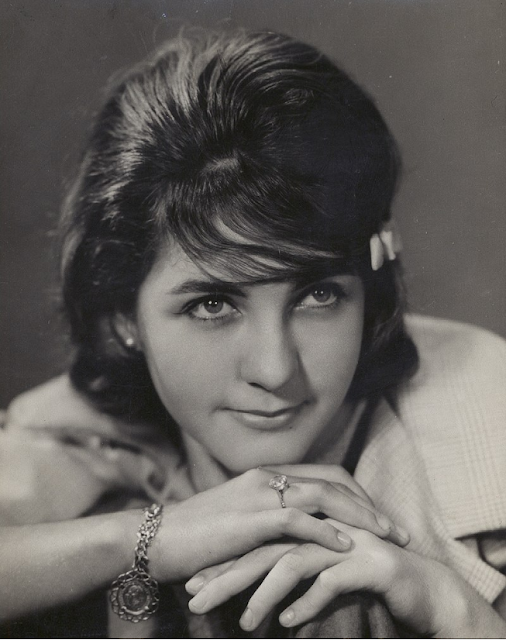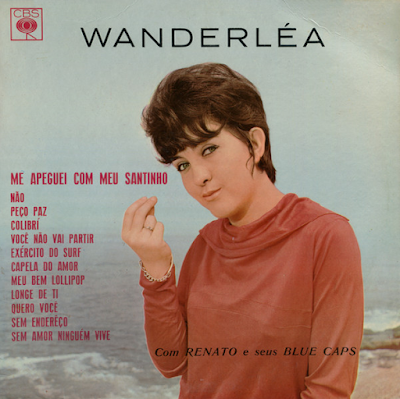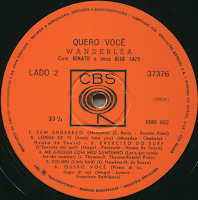Wanderlea in her prime.
'Revista do Radio' - n.734, 12 October 1963 - introduces Wanderlea to their readers as the Teenager from Minas who wants Celly Campello's crown & scepter.
Wanderlea Salim was born on 5 June 1945, in Governador Valadares-MG, northern Minas Gerais, but was raised in Lavras-MG, a southern MG city not too far from the State of Rio de Janeiro.
Wanderlea's mother & father Odete and Antonio Salim had a predilection for names starting with W so they had Wander, the eldest son, then came Wanderley, Wanderbele, Wanderlea, Wanderbil, Wanderte and Wanderlou not including the children who died in infancy.
Wanderlea is 1.68 meters tall and weighs 56 kg; she has light brown hair and green eyes. Apart from being a professional singer Wanderlea loves foreign languages and is currently taking a course of English at IBEU (Instituto Brasil-Estados Unidos) and French at Maison de France.
Mr Antonio Salim who sold earth-moving tractors in Lavras-MG thought he'd do a much better businesse if he moved to Rio de Janeiro-DF, so that's what the Salim family did in 1955, when Wanderlea was 10 years old. They settled in a suburb at Ilha do Governador but Mr Salim also bought a farm at Km 15 of the Old Rio-Petropolis Road (built by President Washington Luiz in 1928) where the family spent a lot of time together.
Wanderlea who had always liked to sing along with the radio entered a talent-scout competition at TV Rio called 'the most beautiful youthful voice' in which she came up on top winning the right to record at Columbia Records. Mr Salim nixed it for he thought nice girls from good families didn't belong in the music business. After many attempts at trying to convince her father to change his mind she finally made it. She promised him she wouldn't give up school and Mr Salim went along with his daughter to Columbia's recording studio in June 1962, where she cut a 78 rpm single featuring 'Meu anjo da guarda' (Rossini Pinto-Fernando Costa) b/w 'Tell me how long', a spiritual written by Reverend Samuel Kelsey, accompanied by Astor & his combo.
'Meu bem lollipop' (My boy lollipop) was a cover of a song which Jamaican Millie Small had taken to #1 in the Brazilian charts which defeated the purpose of covering hits the general public hadn't heard yet ; 'Capela do amor' (Chapel of love) had been a #1 in the USA for 3 weeks on 6 June 1964 for girl-group Dixie Cups; 'Peço paz' (Just once more) came straight from Rita Pavone's album 'The International Teenage Sensation', an attempt by Pavone's manager to break into the US market but with no avail; 'Sem endereço' (Memphis, Tennessee) is a rock ever-green originally done by Chuck Berry in 1959; 'Longe de ti' is a cover of 'Away from you' of Liverpool's Gerry & the Pacemakers; 'Exército do surf' is a cover of 'L' esercito del surf', a Catherine Spaak Italian hit; 'Quero você' which is the title of the album is a cover of 'Prima di te, dopo di te', another Catherine Spaak Italian hit.
Mr Antonio Salim who sold earth-moving tractors in Lavras-MG thought he'd do a much better businesse if he moved to Rio de Janeiro-DF, so that's what the Salim family did in 1955, when Wanderlea was 10 years old. They settled in a suburb at Ilha do Governador but Mr Salim also bought a farm at Km 15 of the Old Rio-Petropolis Road (built by President Washington Luiz in 1928) where the family spent a lot of time together.
Wanderlea who had always liked to sing along with the radio entered a talent-scout competition at TV Rio called 'the most beautiful youthful voice' in which she came up on top winning the right to record at Columbia Records. Mr Salim nixed it for he thought nice girls from good families didn't belong in the music business. After many attempts at trying to convince her father to change his mind she finally made it. She promised him she wouldn't give up school and Mr Salim went along with his daughter to Columbia's recording studio in June 1962, where she cut a 78 rpm single featuring 'Meu anjo da guarda' (Rossini Pinto-Fernando Costa) b/w 'Tell me how long', a spiritual written by Reverend Samuel Kelsey, accompanied by Astor & his combo.
'Meu anjo da guarda' had good air-play with Columbia releasing a second 78 rpm in November 1962, 'Ao nascer do sol' (Cuando calienta el sol) (Mario Rigual-Carlos Rigual;v.: Jota Morais), a ballad b/w 'Quero amar' (Castro Perret), a twist. Soon, Columbia released Wanderlea's first album which we review below:
Wanderlea's 1st album released in May 1963, is a mixed-bag of good and bad recordings; 'Meu anjo da guarda' is a good track that had been released the year before. The other good tracks are the ones in which Wandeka is accompanied by the 4-instrument combo: drums, guitars, bass & saxophone and they are: 'Picada da pulguinha' (Gilberto Lima-Dora Lopes), 'Quero amar' and 'Estudante' (both by Castro Perret) are good uptempo records even though Wandeka still repeated Celly Campello's maneirisms too often. 'Meu maior desejo' (Rossini Pinto-Fernando Costa) is not bad but it's almost one-toned from beginning to end; the instrumental is pretty good though. I guess 'Birutinha' (Jorge Smera-Othon Russo) could be included among the good tracks. It's supposed to be sexy with words like 'taradinha', 'maluquinha' etc. 'Pescaria com twist' (Murillo Latini-Renan França) is not bad instrumentally but the words are dreadful.
Among the not-so-good tracks are: 'Não existe o amor' (Non esiste l'amore) (Vivarelli-Beretta;v.: Othon Russo) could be good but Mr Russo translated it from Italian abusing the second-person-singular which sounds stilted and old-fashioned; 'Quando setembro vier' (Come September) an instrumental baião written by Bobby Darin with added Portuguese lyrics by Titto Santos is atrocious. 'Goody goody' (Johnny Mercer-Malneck) so marvelously covered a few years back by Frankie Lymon is a complete failure; the pace is ridiculously slow, Wandeka's English is not what it should be; a mistake that should be erased. 'Dá-me felicidade' (Free me) based on Mexican singer Enrique Guzmán's cover 'Dame felicidad' (Breedlove) is bad. Rossini Pinto should have listened to Michele's Italian 'Ridi', a much better cover. Wandeka tries to imitate Guzmán's 'hiccups' with no flair... she herself had a terrible 'hiccup' of her own that she has given up eventually (thank God). 'Meu coração canta' (My heart sings) (En ecoutant mon coeur chante) (Jean Marie Blanvillain-Henry Herpin; words in English by Harold Rome; words in Portuguese by Fred Jorge) is wrong from the start. Too high-pitched for poor Wanderlea. Fortunately, the album producer (probably Rossini Pinto) did not include 'Tell me how long' in it. It would have been the feather that broke the camel's back.
Wanderlea's 2nd album, "Quero você', released by CBS in 1964 was a completely different cup-of-tea: it had Renato & seus Blue Caps accompanying her which made a huge difference. Renato's boys were really proficient in their instruments as well as their vocal background giving the album an edge when compared with the 1st LP. Apart from Rossini Pinto's 'Sem amor ninguém vive' all the other 11 songs were covers of Anglo-American or European hits. So instead of following the new trend of recording Brazilian original material CBS reverted to Celly Campello's time when the 12 tracks of a rock album were covers. That old trend would ride the waves for the next few years.'Meu bem lollipop' (My boy lollipop) was a cover of a song which Jamaican Millie Small had taken to #1 in the Brazilian charts which defeated the purpose of covering hits the general public hadn't heard yet ; 'Capela do amor' (Chapel of love) had been a #1 in the USA for 3 weeks on 6 June 1964 for girl-group Dixie Cups; 'Peço paz' (Just once more) came straight from Rita Pavone's album 'The International Teenage Sensation', an attempt by Pavone's manager to break into the US market but with no avail; 'Sem endereço' (Memphis, Tennessee) is a rock ever-green originally done by Chuck Berry in 1959; 'Longe de ti' is a cover of 'Away from you' of Liverpool's Gerry & the Pacemakers; 'Exército do surf' is a cover of 'L' esercito del surf', a Catherine Spaak Italian hit; 'Quero você' which is the title of the album is a cover of 'Prima di te, dopo di te', another Catherine Spaak Italian hit.
by mid-1965 Wanderlea was popular in the whole country; 'Intervalo', 22nd November 1965.
'Intervalo', 22nd November 1965.
a very young Wanderléa.















No comments:
Post a Comment